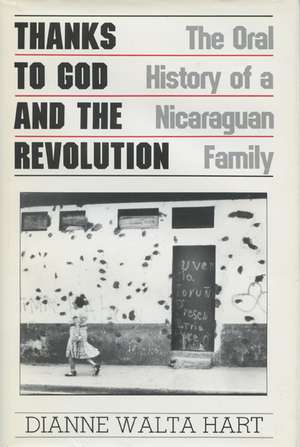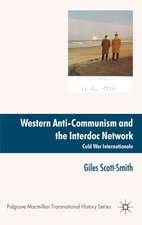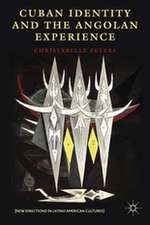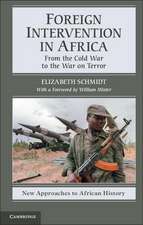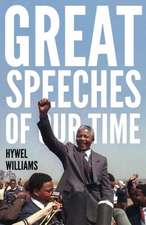Thanks To God And The Revolution
Autor Dianne Walta Harten Limba Engleză Hardback – 14 sep 1990
Winner of the 1991 Chicago Women in Publishing Award
In a restaurant in Estelí, Nicaragua, Dianne Walta Hart, a visiting American scholar, and Marta Lopez, member of a Nicaraguan women's organization, began to talk of the Sandinista revolution and of the changes it had brought, especially for women. Their conversation was to continue at intervals over the next four years; it expanded to include Marta's mother, Doña María, her sister, Leticia, and her brother, Omar, a Sandinista soldier. From these conversations has come the powerful and moving oral history of a Nicaraguan family in the twentieth century: a testimonial by ordinary people caught up in civil strife and living in a country devastated by war and inflation.
Laying bare the inner workings of the Lopez family, Dianne Walta Hart evokes a picture of a close-knit and loving family. Tracing their story from the years of repression and guerrilla activity under Somoza through an era of personal and political revolution in the 1970s and 1980s, she shows people persevering against every kind of adversity.
In a restaurant in Estelí, Nicaragua, Dianne Walta Hart, a visiting American scholar, and Marta Lopez, member of a Nicaraguan women's organization, began to talk of the Sandinista revolution and of the changes it had brought, especially for women. Their conversation was to continue at intervals over the next four years; it expanded to include Marta's mother, Doña María, her sister, Leticia, and her brother, Omar, a Sandinista soldier. From these conversations has come the powerful and moving oral history of a Nicaraguan family in the twentieth century: a testimonial by ordinary people caught up in civil strife and living in a country devastated by war and inflation.
Laying bare the inner workings of the Lopez family, Dianne Walta Hart evokes a picture of a close-knit and loving family. Tracing their story from the years of repression and guerrilla activity under Somoza through an era of personal and political revolution in the 1970s and 1980s, she shows people persevering against every kind of adversity.
Preț: 188.15 lei
Nou
Puncte Express: 282
Preț estimativ în valută:
36.01€ • 37.54$ • 29.92£
36.01€ • 37.54$ • 29.92£
Carte tipărită la comandă
Livrare economică 20 martie-03 aprilie
Preluare comenzi: 021 569.72.76
Specificații
ISBN-13: 9780299126100
ISBN-10: 0299126102
Pagini: 384
Dimensiuni: 161 x 238 x 25 mm
Greutate: 0.62 kg
Ediția:New.
Editura: University of Wisconsin Press
Colecția University of Wisconsin Press
ISBN-10: 0299126102
Pagini: 384
Dimensiuni: 161 x 238 x 25 mm
Greutate: 0.62 kg
Ediția:New.
Editura: University of Wisconsin Press
Colecția University of Wisconsin Press
Notă biografică
Diana Walta Hart is senior instructor in the Department of Foreign Languages and Literatures at Oregon State University, Corvallis.
Descriere
Winner of the 1991 Chicago Women in Publishing Award
In a restaurant in Estelí, Nicaragua, Dianne Walta Hart, a visiting American scholar, and Marta Lopez, member of a Nicaraguan women's organization, began to talk of the Sandinista revolution and of the changes it had brought, especially for women. Their conversation was to continue at intervals over the next four years; it expanded to include Marta's mother, Doña María, her sister, Leticia, and her brother, Omar, a Sandinista soldier. From these conversations has come the powerful and moving oral history of a Nicaraguan family in the twentieth century: a testimonial by ordinary people caught up in civil strife and living in a country devastated by war and inflation.
Laying bare the inner workings of the Lopez family, Dianne Walta Hart evokes a picture of a close-knit and loving family. Tracing their story from the years of repression and guerrilla activity under Somoza through an era of personal and political revolution in the 1970s and 1980s, she shows people persevering against every kind of adversity.
In a restaurant in Estelí, Nicaragua, Dianne Walta Hart, a visiting American scholar, and Marta Lopez, member of a Nicaraguan women's organization, began to talk of the Sandinista revolution and of the changes it had brought, especially for women. Their conversation was to continue at intervals over the next four years; it expanded to include Marta's mother, Doña María, her sister, Leticia, and her brother, Omar, a Sandinista soldier. From these conversations has come the powerful and moving oral history of a Nicaraguan family in the twentieth century: a testimonial by ordinary people caught up in civil strife and living in a country devastated by war and inflation.
Laying bare the inner workings of the Lopez family, Dianne Walta Hart evokes a picture of a close-knit and loving family. Tracing their story from the years of repression and guerrilla activity under Somoza through an era of personal and political revolution in the 1970s and 1980s, she shows people persevering against every kind of adversity.
